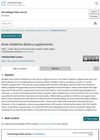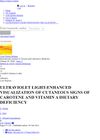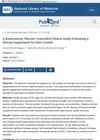
Eating less calories, focusing on complex carbs, and reducing fats can help manage type II diabetes.
 May 2020 in “Current developments in nutrition”
May 2020 in “Current developments in nutrition” Low dose finasteride doesn't change lipid profile or metabolic parameters in mice.
29 citations,
December 1989 in “The journal of nutrition/The Journal of nutrition” Mice's intestinal uptake of pantothenic acid is not affected by dietary levels.
 14 citations,
January 2020 in “Dermatology Online Journal”
14 citations,
January 2020 in “Dermatology Online Journal” Some dietary supplements, like vitamins B6/B12, iodine, whey protein, and muscle-building products, can cause or worsen acne.
 8 citations,
April 2020 in “European Journal of Nutrition”
8 citations,
April 2020 in “European Journal of Nutrition” Newborns' hair shows how much caffeine their mothers drank during pregnancy.
 1 citations,
December 2015 in “Endocrinology”
1 citations,
December 2015 in “Endocrinology” Decanoic acid may help treat PCOS by reducing androgen levels and improving glucose sensitivity.
7 citations,
January 1991 in “Comparative biochemistry and physiology. A. Comparative physiology” A diet high in vitamin E improved blood health, skin, and fur in common marmosets.
 5 citations,
September 2017 in “Journal of Cosmetic Dermatology”
5 citations,
September 2017 in “Journal of Cosmetic Dermatology” A marine protein-based dietary supplement can safely boost hair growth and reduce hair loss in people with thinning hair.
 4 citations,
January 2022 in “Open Health”
4 citations,
January 2022 in “Open Health” Eating healthy, exercising, and changing behaviors are the best first steps to treat Polycystic Ovary Syndrome (PCOS).
 February 2024 in “Animals”
February 2024 in “Animals” Giving selenium yeast to pregnant goats leads to better hair growth and cashmere quality in their babies.
 January 2024 in “Journal of Ayurveda and integrative medicine”
January 2024 in “Journal of Ayurveda and integrative medicine” Millets may help reduce chemotherapy side effects like nausea, fatigue, and hair loss.
March 2021 in “World rabbit science” Adding 0.2% taurine to Angora rabbits' diet improves wool production and overall health.
 October 2012 in “European Neuropsychopharmacology”
October 2012 in “European Neuropsychopharmacology” People with early psychosis eat more calories, saturated fat, and sugar, and the drug olanzapine may lead to eating even more calories.
 April 2012 in “The Journal of Urology”
April 2012 in “The Journal of Urology” Eating more omega-3 and less omega-6 fatty acids may lower the risk of developing prostate cancer.
30 citations,
September 2016 in “Aging Cell” Low selenium levels can extend lifespan but worsen health issues.
 6 citations,
March 2011 in “Experimental Dermatology”
6 citations,
March 2011 in “Experimental Dermatology” Too much or too little selenium in the diet can cause hair loss and graying in mice.
 January 2020 in “Asian Journal of Basic Science & Research”
January 2020 in “Asian Journal of Basic Science & Research” Nutrease powder, a high-protein, low-carb supplement, can help manage Polycystic Ovary Syndrome symptoms, regulate periods, improve ovulation, and restore fertility.
 10 citations,
May 1986 in “Experientia”
10 citations,
May 1986 in “Experientia” Too much zinc in the diet can cause hair loss and color change in young mice by reducing copper in the body.
 17 citations,
April 2004 in “Acta Clinica Belgica”
17 citations,
April 2004 in “Acta Clinica Belgica” UV light makes skin signs of lack of carotene and vitamin A more visible.
2 citations,
January 2022 in “Italian journal of dermatology and venereology” Unhealthy lifestyle and diet may increase the risk of early hair loss in young men.
 1 citations,
October 2017 in “Food Additives & Contaminants: Part A”
1 citations,
October 2017 in “Food Additives & Contaminants: Part A” A new minoxidil-like substance, triaminodil, was found in an illegal hair growth supplement.
 December 2024 in “PubMed”
December 2024 in “PubMed” The supplement improved hair density and was safe to use.

North American ginseng extract helped regrow hair in balding mice.
June 2020 in “The journal of investigative dermatology/Journal of investigative dermatology” Different diets change the fat composition in mouse skin, often reducing beneficial omega-3 fatty acids.
11 citations,
October 2020 in “Sultan Qaboos University medical journal” Bariatric surgery helps with weight loss but can cause complications and nutritional deficiencies.
33 citations,
January 2001 in “Critical care clinics” Dietary lipids affect inflammation and are crucial for normal cell function and immune health.
33 citations,
November 1999 in “The Veterinary clinics of North America. Small animal practice/Veterinary clinics of North America. Small animal practice” Dogs with zinc-responsive dermatosis need zinc supplements or dietary changes for treatment.
2 citations,
January 2018 in “Elsevier eBooks” Probiotics and dietary changes can help treat acne.


















